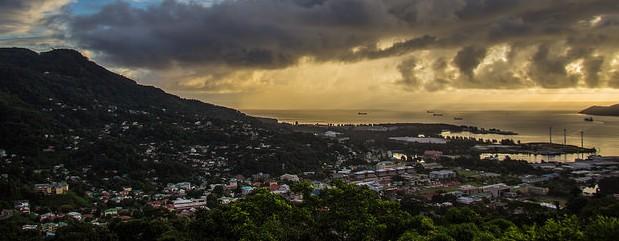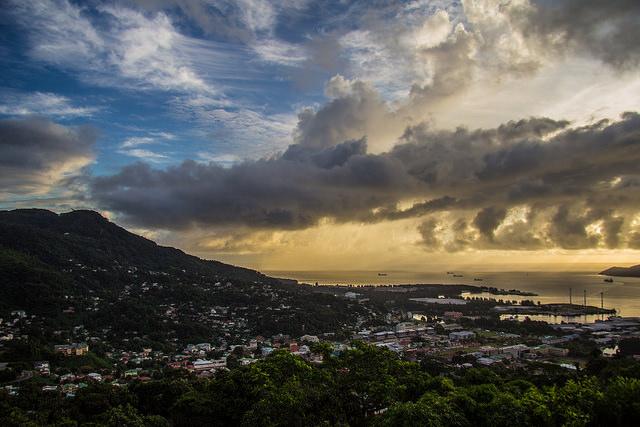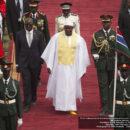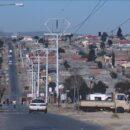Tensions in the Seychelles after neck and neck elections

In presidential elections in December, the incumbent President James Michel won by just 193 votes.
Although everyday life in the Seychelles remains as peaceful as ever – living up to the islands’ paradisiacal tourist image – there have been tensions brewing below the surface ever since disputed elections last month.
In the presidential election on 3–5 December, President James Michel was officially re-elected, beating his closest rival by a mere 193 votes – a razor sharp margin even in a country with a population of just 90,000 people. The opposition, led by Wavel Ramkalawan, immediately called for a review, intimating that there had been vote rigging and irregularities.
The Supreme Court is currently scrutinising the electoral process following petitions from the opposition and will eventually decide whether the poll will be re-run later this year.
In the meantime, accusations are being thrown in both directions. There are rumours, gleefully disseminated by the opposition Seychelles Weekly, that poor people were paid up to Rs5,000 ($380) to give up their identity cards until after the election. Meanwhile, the government-friendly Times of Seychelles has reported that attempts to set fire to a local party office and primary school have been discovered, alleging that supporters of the opposition may have been behind them.
The ruling party accuses the opposition of being sore losers, while the latter accuse the president and his supporters of being cheats.
Running for office
The Seychelles’ current tension needs to be understood in the context of the country’s recent history. A former British colony, this Indian Ocean archipelago became independent in 1976 led by President James Mancham and Prime Minister Albert René. These two figures represented opposing political views, Mancham being a free-market enthusiast, René a postcolonial socialist.
Just a year later in 1977, this rivalry came to a head and René took power through a coup. The Seychelles became a de facto one-party state ruled by René and his Seychelles People’s Progressive Front (SPPF), known in Kreol as Parti Lepep.
For the next 14 years, the SPPF ruled without official opposition, but then, in 1991, President René announced the reintroduction of multiparty democracy. Mancham returned from exile and elections were organised. In 1993 and 1998, René and his party won resoundingly.
In 2001, the incumbent emerged victorious once again, but this time around, it was much closer. In the absence of Mancham, the main opposition contender was Ramkalawan, a Mauritian-educated priest and the frontman of the Seychelles National Party (SNP), who garnered an impressive 45%. This set the precedent for the elections that followed.
In 2004, René finally stepped down, passing on power to Vice-President James Michel. The man at the top changed for the first time since 1977, but the trend of elections continued in much the same vein. Michel won in 2006, 2011 and now again in 2015, with Ramkalawan running not far behind with over 40% of the vote each time.
How popular is Michel?
There are genuine ideological differences between Michel and Ramkalawan. Whereas Michel continues the moderate socialist policies of his predecessor, Ramkalawan runs on a liberal-conservative platform. And while the ruling SPPF accuses the opposition of incompetence and opportunism, intimating that only they have the skills to run the country, the SNP alleges that its rivals rule through cronyism and have been unable to instigate necessary reforms in the Seychellois economy. They have now also added electoral fraud to their list of accusations.
Among the electorate, it is difficult to say how popular the long-serving James Michel really is. “Yes, he is competent, honest and wants the best for his people,” say some. However, others claim that the “people are fed up with him” and that “if he had been popular, he would have got 55, or 60, or even 70% of the vote”.
Supporters of the government say that if there were a change of power, welfare would decline and inequality would increase, while those sympathetic to the opposition insist the country can do better and point to recent statistics that suggest 40% of the population lives below the poverty line.
Some others simply complain that there is a lack of choice. One small businessman, exasperated with the rules and regulations of what he sees as “still in many ways a one-party state”, jokes that even the road network doesn’t give people alternatives. “There’s just one road to Victoria [the capital] – there is too little choice in this country!”
It’s a small world
Perhaps the most characteristic aspect of Seychellois politics and economics is its tiny scale. With only 90,000 citizens, anonymity is difficult to achieve and developing a state bureaucracy without drawing on personal networks is virtually impossible. People in the political class know each other either personally or through common acquaintances, and they know who they can trust and who to avoid.
One example of this attitude can be seen in the rumours that spread at one point that Etihad Airlines would pull out of Seychelles if Ramkalawan won the presidential election. Clearly unfounded, this far-fetched idea is indicative of the widespread faith here that personal networks are the key to everything.
The significance of personal networks cannot be spirited away since it concerns the very fabric of small-scale Seychellois society. Moreover, the stark dualism of Seychellois politics encourages polarisation rather than compromise.
This is unlikely to change unless there is electoral reform that could incorporate strong proportionality. This might in turn enable party pluralism, dampening the dualism which is currently creating an unproductive tension in Seychellois society.
Without this, we are likely to see similar conflicts arise later this year when parliamentary elections – and perhaps re-run presidential polls depending on how the court rules – will see the same two rival parties pitted against each other once again.
Thomas Hylland Eriksen is Professor of Social Anthropology at the University of Oslo. One of his research interests is creole society.
[Correction (23/01/16): the article originally mistakenly referred to Mancham as unelected. This is been corrected.]








…”A fools paradise is a wise men`s hell”..
Great article, Thanks. The current government of James Michel, elected president who did not actually constitutionally win the 50%+1 votes, to be elected is being challenged at High Court by the Opposition Party for election irregularities. James Michel is NOT an honest man as his supporters portrayed him, because if he were, he would not tolerate the atrocities of his own people setting up fires in buildings the day before the election and pinned the blame on the opposition party for change. If he were HONEST, he would have stamped out hard drugs that are infesting our beautiful country, while the drug barons roam freely. Him being honest, I would never agree, since he is an accomplice in the murder of opposition party Mr Gerard Hoareau in London, Simon Denounce, Alton Ah-Time, Hasan Ali in Seychelles, amongst many others whom his party abducted after the Coup D’état of 5th June 1977. James Michel might try to fool foreigners that he is honest, but he cannot fool the Seychelles people as they know he has a lot of blood on his hands. By the Coup D’état, he committed TREASON against his country and this crime has not just evaporated in thin air. I share my view on behalf of the United Opposition for Change. We are fed up of a corrupted government staying in power for 38+ years by rigging the elections every time. We are fed up that James Michel are selling our land to the Arabs for pittance, while him and his associates are filling up their bank accounts with backhands . I would not say James Michel is popular, because although his party was giving hand out to people, buying their votes, he could not even get 50% votes. That says it all, he is in serious trouble. Imagine if the election was REALLY fair as they do in UK, I reckon he would only win about 40% and he would not be wearing that presidential crown on his head today. I would finally summarize James Michel and his party, Parti Lepep as CORRUPTED, BREEDERS OF VIOLENCE, CRIMINALS, LIARS, UNPOPULAR AT THE MOMENT, BECAUSE THE MAJORITY OF SEYCHELLOIS IS DEMANDING A CHANGE. We Will Not Rest Until this is Accomplished.
Thank you. Helpful and to the point.